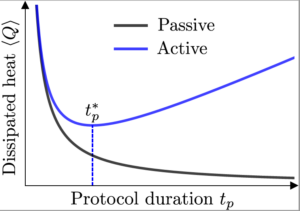Prof. Etienne Fodor from the University of Luxembourg, together with Dr Luke K. Davis from the University College London and Dr Karel Proesmans from the Niels Bohr Institute, published their paper entitled “Active matter under control: Insights from response theory” in Physical Review X.
Dynamics and phases far from equilibrium:
Active matter is a class of nonequilibrium systems where each component extracts energy from its environment to fuel a sustained dynamics. Examples of such systems range from living matter, such as bacterial colonies, to synthetic and social systems, such as assemblies of robots and human crowds. Many theoretical studies have already established minimal models which reproduce the phase diagram of such systems; namely, how to stabilize a given phase by selecting appropriate values of some control parameters. Yet, little is known about the dynamical control of active matter; namely, how to drive the system from one phase to another by changing some control parameters in time.
Theoretical framework for thermodynamic control:
Here, the authors have developed a novel, versatile framework for finding the optimal procedure to dynamically control a generic active system. This framework predicts the trajectory of control parameters which achieves the least dissipation. Interestingly, such predictions can be readily deployed in experimental settings: they provide the necessary guidelines to apply controlled perturbation stabilizing a target phase at a minimum cost of energy. For instance, this framework could help predict how to control the collective behavior of cells in biological tissues, with many biomedical applications.
News
Optimal control of active matter

-
Faculty of Science, Technology and Medicine (FSTM)
19 February 2024 -
Category
Research -
Topic
Physics & Materials Science